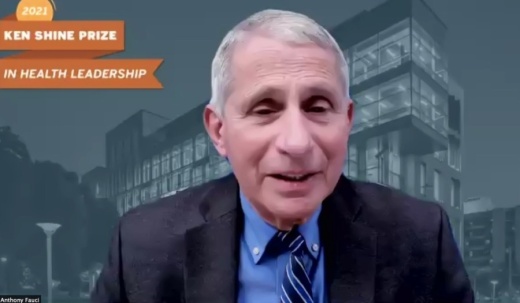“That’s an example of . . . the interface between fundamental basic research that’s done five and ten years ago and the translation of that into an intervention that is groundbreaking,” Fauci said. “The fundamental basic science that [The University of Texas] supports is just spectacular.”
McLellan, who leads a lab of epidemiologists at UT, began working on vaccine research with NIAID partners in 2008. His team announced the discovery of the attacking “spike protein” common to coronaviruses in 2016 and developed a method to lock the protein into its original shape, promoting the production of antibodies in cells.
The McLellan Lab at UT used that base of research to help develop a vaccine for COVID-19 when the genome sequence for coronavirus was released in January. With a well-established foundation of research, the team was able to collaborate with Pfizer and Moderna to take vaccines to clinical trials by spring. By the end of 2020, both vaccines were being administered to high-priority populations in the United States.
According to Fauci, it was only because of the decade of research put in by McLellan and others at the NIAID that allowed such a quick timeline, around 11 months from the genome sequence’s release to administering doses; Fauci said he was prepared to wait 12-18 months before seeing a COVID-19 vaccine authorized by the Food and Drug Administration.
“If there was ever an example of the role of basic biomedical research in transforming how we’re responding to this historic pandemic—boy, I can’t think of a better one than that,” Fauci said.
Fauci’s lecture was given in honor of a prize awarded to him by Dell Medical School. The annual Ken Shine Prize in Health Leadership is given “to leaders who make significant advancements in health.” Fauci received the award for his contributions guiding the response to the coronavirus pandemic.
Learn more about local contributions to vaccine research here.





